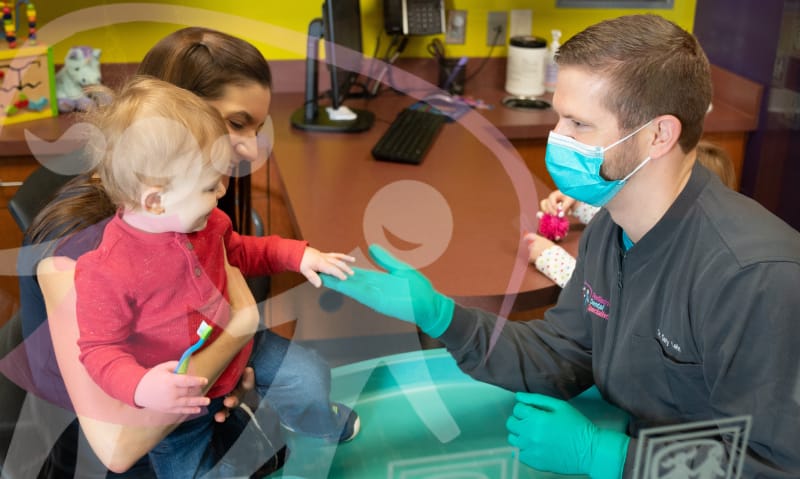Yes, Even Baby Teeth Need Treatment

It’s easy to think that since babies grow up and eventually lose their primary teeth, that those baby teeth don’t need dental treatment. But, the truth is that baby teeth need treatment too. Without the proper dental care, your baby or toddler can develop a cavity in those little teeth, leading to toothache or other tooth pain. So, if you are a young parent wanting to know how to identify a cavity in your young one, and you are wondering about dental fillings, be sure to keep reading.
Causes of Cavities in Baby Teeth
Cavities in baby teeth result from tooth decay caused by bacteria. This bacteria can come from many foods, particularly carbohydrates that are left on the teeth after eating. Typical culprits include milk, raisins, cake, candy, cereals, bread, and fruit juices. Children that consume soda are also more likely to develop tooth decay. This oral bacteria live in the mouth, and when not cleansed away, turn into plaque that sticks to the teeth. These acids from the bacteria eat away at your child’s dental enamel, eventually turning into cavities.
Symptoms of a Cavity in Your Child’s Baby Teeth
According to the Centers for Disease Control and Prevention (CDC), about 20% of children between the ages of five and 11 have at least one untreated decayed tooth. This means that your child has just as high of a probability of developing a cavity. However, when your little one can’t easily convey their feelings to you, it can be hard to know just what is causing their pain.
So, stay on the lookout for one or more of the following symptoms to determine if your child has a toothache with a cavity as the likely culprit. Knowing what to look for can help parents soothe their child’s tooth pain faster and ensure that their kids get the dental treatment they need. Some signs might include:
- A hole or pit in the tooth.
- A white spot or stain on the tooth.
- Demonstrated sensitivity to hot or cold temperatures.
- Toothache or general tooth pain.
- Tooth sensitivity when consuming sweets.
And, knowing how to identify a potential cavity should not be confused with other issues that can be causing a non-cavity-related toothache. Typical causes of a toothache are:
- Emerging teeth.
- Chipped teeth or cracked dental enamel.
- Loose or missing fillings (yes, children can get dental fillings in their baby teeth).
- Tooth erosion or decay.
- Food that has become stuck between your child’s teeth.
Providing Relief for a Baby Teeth Toothache
If your little one has a toothache that can’t be otherwise explained, it usually means it is time to pay a trip to their pediatric dentist. In the meantime, we suggest a salt water rinse for children old enough to be able to swish and spit. You can create a saline solution by stirring one teaspoon of salt into eight ounces of water that has been boiled and cooled. Have your child use the salt water rinse while the water is still warm, but not hot enough to burn their mouth. And, parents should not try this home remedy for children who are too young to swish and spit.
You may also wish to try an over-the-counter (OTC) medication to relieve your child’s tooth pain. Ibuprofen and acetaminophen can be highly effective in soothing a toothache, but it is important to follow dosage information according to the manufacturer’s specifications or specific instructions from your medical care providers or pediatric dentist.
If your child’s tooth pain can’t be soothed by an OTC remedy or a salt water rinse, be sure to book an appointment with your child’s pediatric dentist. Toothaches that do not go away on their own or with the above suggestions can indicate a cavity or other dental concern that must be treated by a dental professional.
Dental fillings or tooth extractions for kids.
When you bring your child to the dentist for their regular checkup or for treatment for a toothache, the dentist will look for signs of a cavity. And, as we said earlier, even baby teeth can get cavities. The dentist may recommend a dental filling for your child in some cases. Fillings are commonly used in preventive dentistry to treat dental decay and cavities proactively.
Even kids that brush their teeth twice a day, floss once a day, and rinse with a kid-friendly mouthwash can require fillings, even in their baby teeth. Pediatric Dental Specialists offer tooth-colored fillings, designed to match your child’s remaining natural teeth. These fillings protect your child’s teeth from further decay and can give your child a boost of confidence when they flash their pearly whites.
Your child’s pediatric dentist may decide that tooth extraction is the best course of action in extreme situations. It is generally considered a last resort to extract baby teeth as premature extraction can cause problems when your child’s adult teeth are ready to come through around ages four to seven. The remaining natural teeth can shift to fill the gap when a tooth is extracted, and for this reason, your child’s pediatric dentist may recommend a space maintainer to preserve the gap.
Contact Pediatric Dental Specialists if your child’s baby teeth have a cavity.
If you live in Nebraska near one of our many locations and your child is showing signs of a cavity, we encourage you to bring your child in as soon as possible. All you need to do is request an appointment using our online form, and we’ll work with you to get your appointment on the calendar. The sooner your child’s tooth pain is addressed, the more chances your child has of an effective and pain-free dental treatment.
We look forward to meeting you and your child, and protecting their baby teeth until their permanent teeth are ready to come in.